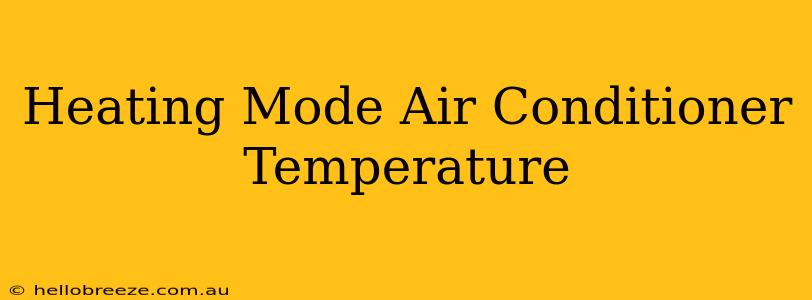Finding the ideal heating mode temperature for your air conditioner can significantly impact your comfort and energy bills. This guide will explore the optimal settings, factors influencing temperature choices, and energy-saving tips.
Understanding Your Air Conditioner's Heating Mode
Many modern air conditioners offer both cooling and heating functionality, often using a heat pump system. Unlike traditional electric or gas heaters, heat pumps move heat from the outside air into your home, making them generally more energy-efficient. However, their effectiveness depends heavily on the outside temperature. Understanding this is key to setting the perfect heating mode temperature.
Factors Affecting Ideal Heating Temperature
Several factors influence the ideal heating temperature for your air conditioner in heating mode:
-
External Temperature: The colder it is outside, the harder your heat pump has to work. This means you might need to set a slightly higher indoor temperature to maintain comfort.
-
Home Insulation: A well-insulated home will retain heat better, allowing you to set a lower heating temperature and still stay warm. Conversely, poorly insulated homes will require a higher setting.
-
Personal Preference: Everyone has a different comfort level. Experiment to find the temperature that feels best to you without compromising energy efficiency.
-
Occupancy: When the house is unoccupied, you can safely lower the temperature to save energy. Programmable thermostats are excellent for automating this process.
Finding Your Sweet Spot: Ideal Heating Mode Temperature
While there's no universally perfect temperature, 68-72°F (20-22°C) is often recommended as a starting point for most people. This range balances comfort with energy efficiency. However, consider these points:
-
Adjust for External Conditions: On extremely cold days, you might need to increase the temperature slightly.
-
Consider Your Health: If you have health concerns or are elderly, you might need to maintain a warmer temperature.
Energy-Saving Tips for Heating Mode
-
Programmable Thermostat: Utilizing a programmable or smart thermostat allows for automatic temperature adjustments based on your schedule, optimizing energy use when you're away or asleep.
-
Regular Maintenance: Regular maintenance, including filter changes and professional inspections, ensures your heat pump operates efficiently and prevents costly repairs.
-
Seal Air Leaks: Identify and seal any air leaks around windows, doors, and other areas to prevent heat loss and improve the efficiency of your heating system.
-
Proper Ventilation: While maintaining a tight seal is important, ensure adequate ventilation to avoid moisture buildup, which can lead to mold and other problems.
-
Utilize Other Heating Sources Strategically: Consider using supplemental heating sources such as a fireplace or space heater in specific rooms to reduce the overall load on your heat pump. This can allow you to lower the overall thermostat setting.
Troubleshooting Heating Mode Issues
If your air conditioner isn't heating effectively, consider:
-
Frozen Evaporator Coil: This is a common issue with heat pumps in extremely cold weather. If you suspect freezing, turn off the unit and call a qualified HVAC technician.
-
Refrigerant Leaks: Low refrigerant levels can significantly impact heating performance. Only a qualified technician should handle refrigerant.
-
Faulty Components: Various internal components can malfunction, impacting heating efficiency. Professional servicing is recommended to diagnose and resolve such issues.
By understanding the factors affecting heating mode performance and implementing these energy-saving tips, you can ensure your air conditioner keeps you comfortable and your energy bills manageable. Remember to consult your air conditioner’s manual for specific operating instructions and maintenance recommendations.

